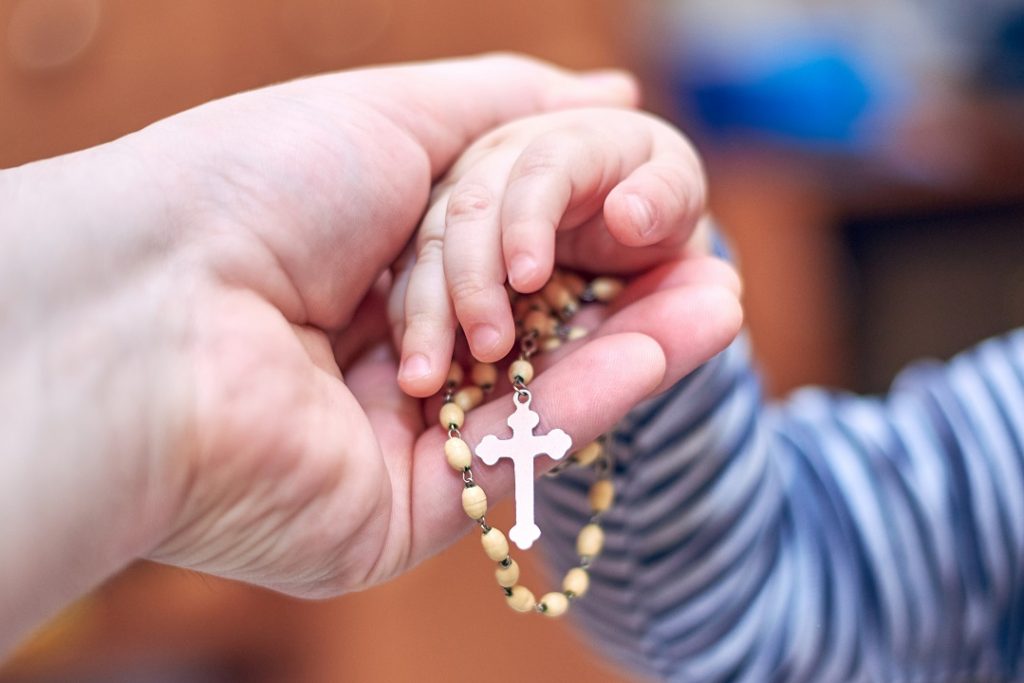Please visit our World Apostolate of Fatima Website for this article and more. And follow our Facebook Page too!
by Michaelyn Hein –

Four years ago, I was in the process of helping my son prepare for his First Reconciliation. Together, we reviewed the Commandments and worked our way through an examination of conscience. We practiced aloud the Act of Contrition and reviewed the steps of a good confession, from “Bless me Father” to absolution. I prided myself on successfully readying my son to bring his sins to Jesus and receive His merciful forgiveness.
Then, one evening, my husband and I got into an argument. While I have no recollection of its topic, I do recall the moment my son checked my pride. It happened as I walked into his room to help him get ready for bed.
“Mommy,” he demanded, “you need to say sorry to daddy.”
I was in no mood for apologizing, but to appease my son, I vowed that I would do so after he was asleep.
“No,” my son disagreed, as if he knew I did not plan to abide by my promise. “Can Daddy come in here and you say sorry now? I want to see.”
I drew a deep breath. His words echoed in my head. ‘I want to see.’
With seemingly no other choice, I called my husband to come into the room. Our son beamed as we apologized and forgave each other. It was penance, reconciliation and mercy in action, and it was a better lesson to our son than anything I had taught him up to that point.
Children don’t want to just hear truth, they want to see it. And for parents, that is our greatest challenge. It is easy to direct one toward the narrow path to heaven, but not so easy to trek that road ourselves.
It is with this truth in mind that we find ourselves in Lent, traversing our 40-day journey to Calvary and, ultimately, to the Resurrection of Easter Sunday. We do a fine job helping our children to experience the season. We volley ideas about what we should each give up for the weeks ahead. We take our family to church to be marked on Ash Wednesday. We eat cheese pizza in lieu of meat each Friday and try to make it to at least one Stations of the Cross over the course of its six weeks.
Yes, we are good at these actions. These are the lessons our children see and grow up knowing well. But how good are we at showing them the harder lessons of Lent?
Practicing prayer
We are called not only to instruct our children to say grace before meals and bedtime prayers, but to lead them, by example, in a deeper relationship with Our Savior.
At Fatima, our Blessed Mother implored Lucia, Jacinta and Francisco to pray the Rosary more deeply and dedicatedly than their rushed “Aves.” Why? Because, said Sister Lucia, “it is the prayer which places us in familiar contact with God.”
That, after all, is the heart of prayer: to develop a real relationship with our heavenly Father. The more we walk the mysteries of the life of Christ, the more easily we see Him. With every repeated prayer on the rosary, the more familiar our relationship with God becomes and the more we desire to be with Him.
As a mother myself, I know how tempting it is to separate myself from my family for intimate time with God in prayer. Still, it is at least equally important to invite our family into our cenacle, the metaphoric room we share time conversing with our Creator. Our children must see this deeper prayer in action.
Practicing fasting
If there’s one thing that’s easy for our children to witness during Lent, it’s our fast. We tend not to keep our fasts between us and our Father “secret,” as Jesus commanded in the Gospel of Matthew. More typically, we boast of what we’ve given up for Lent.
But, St. Basil queried, “What is the benefit of fasting in our body while filling our souls with innumerable evils?” Indeed, our children, who are always watching, see through the hypocrisy of our giving up of coffee but not unkind words. Thus, it is more imperative that they see us fasting from the vices that wound our relationships with God and each other. We must work harder this season at such a fast, so that our children witness our integrity and adopt it, we pray, for themselves.
Practicing almsgiving
St. Teresa of Calcutta taught, “If you want world peace, go home and love your family.”
When we think of giving alms, we often think of those who are distant from us. We sometimes do this, though, at the expense of the souls in our own home. While it is important that our children see us giving our time, talent and money to strangers, it is even more necessary that they witness us giving within our own family the first fruits of our merciful love. These alms are perhaps more valuable to God and to our children than any we give to the world.
When Jesus came upon a blind beggar in Jericho, the man cried to Jesus the cry of all our hearts, the same words my own son begged of me just a few years ago: “I want to see.” Jesus answered with the words “Receive your sight” and the action of healing his blindness.
This Lent may others also see Our Lord not only in what we say, but more so in what we do.
Michaelyn Hein is a Catholic writer, wife and mother who resides in Hopewell, New Jersey.





